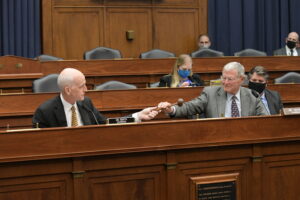Lawmakers on Tuesday rolled out the final compromise version of the fiscal year 2022 National Defense Authorization Act (NDAA), which includes the $25 billion topline boost as well as increases to several procurement programs and efforts aimed at deterring China and Russia.
After the Senate’s version of the NDAA stalled out over disagreements on amendments, the four leaders of the congressional defense committees ironed out the details between the two chambers’ separate bills to complete the final version of the $768.2 billion defense policy legislation.

“We are pleased to announce we’ve come to a bipartisan, bicameral agreement on this year’s National Defense Authorization Act. This year’s agreement continues the Armed Services Committees’ 61-year tradition of working together to support our troops and strengthen national security. We urge Congress to pass the NDAA quickly and the President to sign it when it reaches his desk,” Sens. Jack Reed (D-R.I.) and Jim Inhofe (R-Okla.), leaders of the Senate Armed Services Committee (SASC), and Reps. Adam Smith (D-Wash.) and Mike Rogers (R-Ala), the chair and ranking member of the House Armed Services Committee, wrote in a joint statement.
Typically, a conference of House and Senate lawmakers meet to hash out the differences between two chamber’s versions of the defense authorization bills, with the House having passed its NDAA in late September and SASC advancing its bill back in July before it stalled out in the Senate over the last few weeks.
“Because enacting the NDAA in a timely manner is critical, the two bills were combined through a series of negotiations led by the leadership of the HASC and SASC,” the defense committees noted in a statement. “Negotiators considered proposals offered by members of both parties that were filed in the Senate.”
The House is set to vote Tuesday evening on the final version of the NDAA, with Senate Majority Leader Chuck Schumer (D-N.Y.) adding the upper chamber will then likely take up the bill later this week.
“It’s our view that we will pass that bill as the House sends it because it’s been negotiated already,” Schumer said during a press conference, signaling that the Senate won’t consider amendments to this final version of the bill.
During a House Rules meeting on Tuesday, Smith and Rogers urged the panel to avoid allowing consideration of amendments to the NDAA in the event it would deter lawmakers who are already onboard to pass the new compromise legislation.
“I hope that y’all will not allow any amendments to be attached to this because we have really worked hard to fight off problems to make sure that when this gets to the floor it gets overwhelming support. And I think any amendments that might be attached could be problematic in that endeavor,” Rogers said.
The final NDAA authorizes a $768.2 billion topline for national security programs, reflecting the $25 billion plus-up approved in the House and Senate’s versions, to include $740.3 billion for the Pentagon and $27.8 billion Department of Energy programs.
The NDAA would authorize procurement of 85 F-35s, the number requested by the Biden administration, while boosting funding for five additional F-15EX aircraft and 12 F/A-18E/F Super Hornet “to mitigate the Navy’s strike-fighter shortfall and bolster tactical fighter aircraft capacity,” according to the bill.
For shipbuilding, the final NDAA includes a $4.7 billion increase covering procurement of five more ships than in the budget request, to include two destroyers, two expeditionary fast transports, and one fleet oiler.
Lawmakers also authorized additional funding for five total CH-47F Block II Chinook helicopters and boosted spending on Joint Light Tactical Vehicles after the Army included the program in its list of unfunded priorities.
For the new Pacific Deterrence Initiative aimed at bolstering capabilities to help deter China in the Indo-Pacific region, lawmakers added $2 billion more than was requested for a total of $7.1 billion.
The final NDAA also includes a $600 million increase to the European Deterrence Initiative for a total of $4 billion toward the program aimed at bolstering deterrence efforts with Russia. The bill also includes $300 million for Ukraine security assistance, an increase of $50 million.
Several House Democrats signaled their opposition to the bill over its exclusion of certain measures, to include Rep. Anthony Brown (D-Md.) announcing his ‘no’ vote over concerns the bill “does not sufficiently tackle the issue of extremism within the ranks or adequately address racial bias in the military justice system” and Rep. Donald Norcross (D-N.J.) citing the removal of his “Buy American” provisions previously included in the House’s version of the bill.
Norcross’ provision would have incrementally increased the required percentage of U.S-made parts for major acquisition programs over the next eight years from 55 to 60 percent after enactment, then up to 65 percent by 2024, and ultimately 75 percent by 2029 (Defense Daily, Sept. 2).
“When we get down to the end here we tend to talk about all the things we disagree about and forget about all the provisions that we have agreed about that are in the bill,” Smith said during the House Rules meeting.